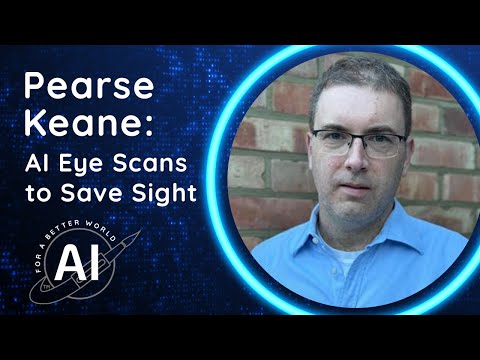Host C. M. (Cathy) Rubin interviews Moorfields/UCL ophthalmologist Prof. Pearse Keane, whose landmark work with Google DeepMind shows how AI can triage eye scans and speed earlier care—without replacing human judgment.
NEW YORK, Nov. 1, 2025 /PRNewswire/ — Planet Classroom’s original series AI for a Better World releases Pearse Keane: The Moorfields Mission , a focused interview on the urgent global challenge of avoidable vision loss and the role of responsible AI in earlier detection, faster triage, and more equitable care.

Watch now on YouTube
Around the world, more than two billion people live with vision impairment—many cases preventable. Against that backdrop, Prof. Keane details how demand for eye care now outpaces capacity: in the UK, ophthalmology is the busiest medical specialty, accounting for nearly 10% of all NHS appointments—about 10 million annually—up by more than a third in five years. He highlights age-related macular degeneration (AMD) as a leading cause of blindness, with ~25% of Europeans over 60 showing early signs and ~400 people in the UK developing severe blinding forms every day. The consequence is stark: patients can lose sight while waiting to be seen.
From proof of concept to patient impact
Host C. M. (Cathy) Rubin probes how to move past hype to measurable outcomes, emphasizing trust, consent, bias mitigation, and transparency—and keeping human clinicians at the center.
- Specialist-level reading of eye scans (landmark study): Building on an early collaboration with Google DeepMind, Keane’s team showed in 2018 ( Nature Medicine ) that AI could read OCT eye scans with accuracy comparable to world-leading specialists across 50+ retinal diseases—a pivotal proof for triage at scale. He underscores the work required to move from “code to clinic” through regulatory pathways (e.g., FDA/MHRA) and monitored deployment.
- Data infrastructure that earns trust: Keane explains INSIGHT, Moorfields’ eye-health data hub, which securely links 35+ million ophthalmic images to clinical outcomes in a cloud pipeline developed with patient-privacy safeguards and sustained public engagement. The goal: accelerate research while protecting people.
- Doing more with less labeled data: Keane introduces RETFound, an open retinal foundation AI model published in 2023 and trained on ~1.6 million retinal images. Because it learns from large unlabeled datasets, it can be fine-tuned with far fewer labeled scans for multiple downstream tasks—from glaucoma and AMD to potential signals of systemic disease. Model code and weights are open for noncommercial research, enabling global teams to build responsibly while clinical devices proceed through regulation.
- What changes for patients
As high-quality imaging becomes standard in community optometry, AI decision support can help prioritize urgent cases, reduce harmful delays, and bring world-class expertise closer to where people live—”in the next couple of years, not decades,” Keane notes. The aim: earlier intervention, better allocation of scarce specialist time, and greater equity in access to sight-saving care.
What Rubin asks—and what audiences learn
- Why Moorfields partnered with Google DeepMind and later built INSIGHT—and the concrete capacity problem clinicians needed to solve.
- How AI can speed scan interpretation, triage urgent cases, and reach patients earlier—while preserving human judgment.
- What it takes to move from research proofs to regulated clinical use.
- How open foundation models like RETFound can accelerate trusted, global innovation.
- What young innovators should know about building ethical, effective health tech.
- Public-health reminder
Rubin closes the episode with a direct call to action: “Early checks save sight. Please book a routine eye exam—especially if you have eye problems, diabetes, or are over 50.”
Watch now on YouTube — Planet Classroom’s streaming channel .
About the Host: C. M. (Cathy) Rubin
C. M. (Cathy) Rubin is a multimedia producer, interviewer, and author covering AI, education, and innovation. She is Co-Founder and CEO of Planet Classroom and founder of CMRubinWorld, where she has published 800+ interviews and articles on the impact of AI on society, including the award-winning series The Global Search for Education .
About Pearse Keane
Pearse Keane is Professor of Artificial Medical Intelligence at UCL, consultant ophthalmologist at Moorfields Eye Hospital, and director–founder of INSIGHT, the world’s largest ophthalmology data resource. An NIHR Senior Investigator, he advances AI to prevent avoidable sight loss.
Watch the episode on Planet Classroom’s official channels and follow the conversation with #AIForABetterWorld and #PlanetClassroom .
About Planet Classroom
The Planet Classroom Network, organized by CMRubinWorld, is a global platform that unites musicians, dancers, game creators, filmmakers, activists, learning innovators, and emerging technologists to entertain, educate, and engage youth worldwide. Since 2020, Planet Classroom has inspired young audiences to explore crucial issues, with programming created for and with youth.
The Planet Classroom Network, produced by CMRubinWorld, brings together creators, youth, and thought leaders to explore the most important issues of our time. Through series like AI for a Better World, Net Zero Speaks, and Problem Solvers, Planet Classroom showcases bold ideas in education, sustainability, and innovation—created for and with youth.
SOURCE Planet Classroom Network



